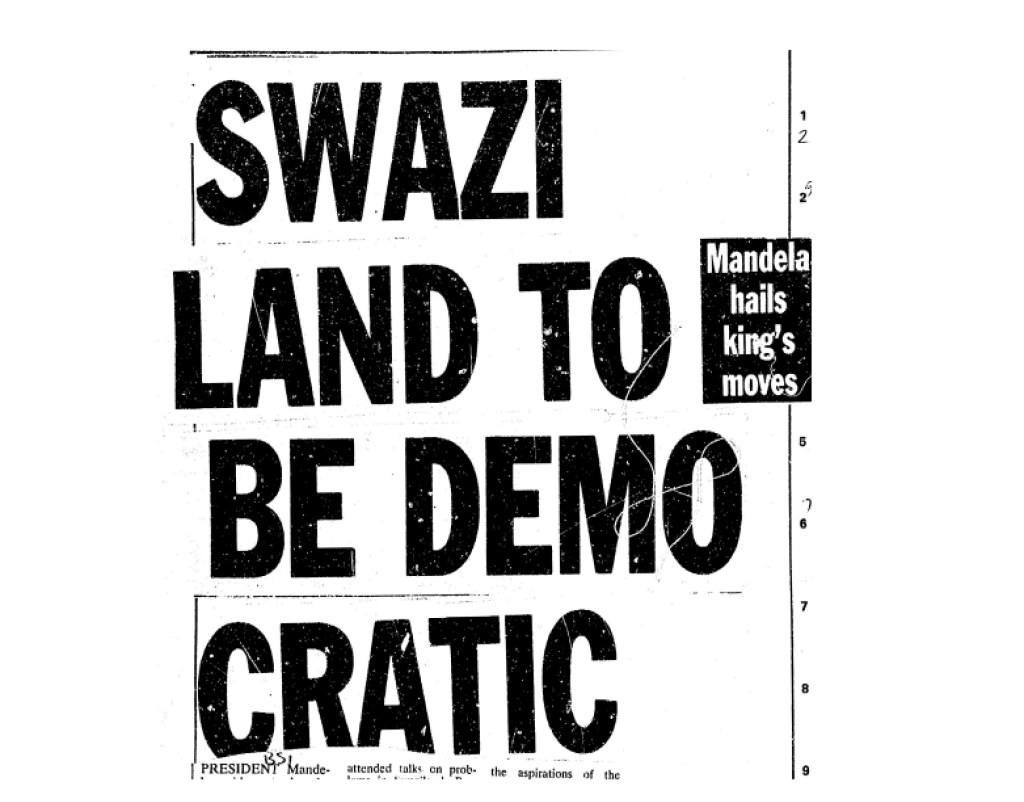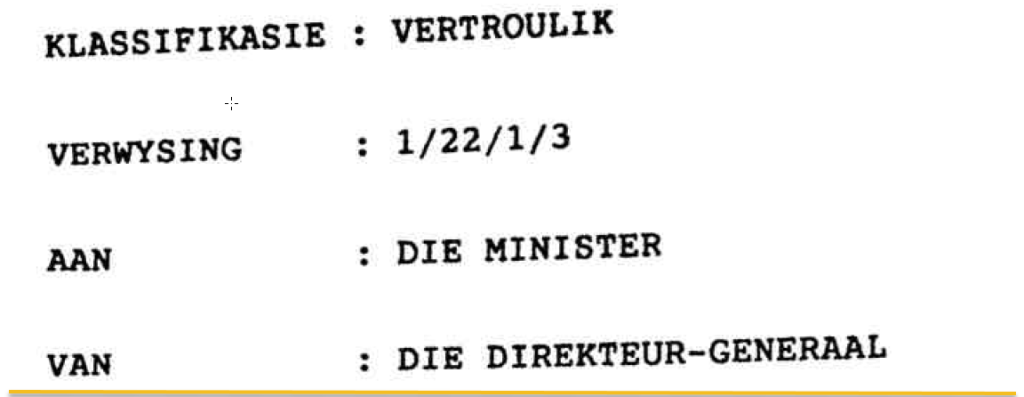Unlike Lesotho and the DRC, military intervention did not feature in its diplomacy when SADC was called on to help resolve problems of stability and democracy in other countries of the region, in particular Swaziland, Zambia and Angola. But like those two cases, these others also underlined the extent to which the achievement of negotiated solutions depends on the extent to which the parties recognise a need to compromise.
On New Year’s Eve, 1997 Mandela was on holiday in Maputo when he received a visit from President Chissano who told him that Kenneth Kaunda, former president of Zambia, who had been arrested a few days earlier, had been released from prison and put under house arrest. That was a result of action by Southern African heads of state and others, urging Zambia’s President Frederick Chiluba to release Kaunda. Kaunda had been arrested on Christmas Day on charges of treason, allegedly for involvement in a failed coup two months earlier while he was out of the country. Mandela released a statement the day after Kaunda’s arrest expressing disappointment and grave concern.
Given the commitment of the members of the Southern African Development Community to the promotion and maintenance of democracy, good governance and human rights in our constituent States and in the region generally, the summary detention and arrest of a former State President and founder of that nation is, whatever the substantive issues at stake, a matter of serious concern.
The detention without trial of political opponents is contrary to the basic principles of a democratic polity, and will not serve to foster confidence in the kind of free political activity to which the Harare declaration commits us as States of this region. We wish to call upon the Zambian authorities to either bring Dr Kaunda to trial immediately or to release him from detention forthwith.
Kaunda’s arrest and Mandela’s intervention were the culmination of problems that had brewed over several years.
Relations between Mandela and Chiluba, and between the ANC and Chiluba’s party were not warm. Strong ties between the ANC and Kaunda’s party, UNIP, had been forged in the years of struggle. UNIP had since 1968 been by law the only party in Zambia until multi-party elections were held in 1991, elections which were won by Frederick Chiluba’s Movement for Multiparty Democracy (MMD). Relations between the ANC and the new MMD government were complicated at that time by issues relating to the repatriation of ANC exiles from Zambia, and the closing down of the ANC headquarters in Lusaka. In addition, a public comment by Mandela during the election had been interpreted as supporting Kaunda, and although he apologised and explained that that had not been his intention, relations between the ANC and MMD and between their leaders, remained cool.666
One of Mandela’s first interventions as SADC Chairman had been an attempt to resolve a dispute between the Zambian government and opposition parties including Kaunda’s UNIP. A constitutional amendment made Kaunda ineligible to contest the 1996 presidential election, on the ground that his parents were of foreign origin. After meeting Chiluba in Pretoria, Mandela spoke to the media.
[President Chiluba] briefed me on the question of the elections in Zambia. As you know there are differences between the government party and the opposition led by Dr Kenneth Kaunda. This of course is a matter of grave concern to all of us especially because it involves Zambia.
As it transpired, the hope of a solution was not fulfilled and the elections went ahead. A year later, Kaunda was arrested then put under house arrest.
With Southern African leaders and the international community sustaining pressure, Mandela continued to intercede and in June 1998 the charges against Kaunda were dropped, following an agreement between Mandela and Chiluba. Mandela said that Kaunda’s political career was over, not because Kaunda had given any undertakings but because, ‘President Chiluba had taken steps which meant that Kaunda would no longer find it necessary to be involved in politics.'668 (After some delay constitutional provision was made for benefits for former presidents). Soon after Mandela’s statement, Kaunda announced that he would resign as president of his party.

Unlike the other countries in the region, Swaziland had no democratic institutions to protect or consolidate. South Africa’s neighbour to the East, between South Africa and Mozambique, was an absolute monarchy with no intention on the part of its rulers to move to democracy. For them, South Africa’s transition was a threatening example; for the people of Swaziland it was an inspiration that gave impetus to the pro-democracy movement. For South Africa, for SADC, and for Mandela, Swaziland posed sharply the challenge of combining a commitment to encourage democratic practices with respect for the sovereignty of neighbours.
Mandela took a close interest in Swaziland and tried to promote democratisation. As in other instances, his approach derived from the belief persuasion could succeed, so what he did was in the main behind closed doors in meetings that he and other Southern African leaders had with the king and those around him.
When King Mswati paid state visit to South Africa in 1995, he was told of the need to reform the country’s constitution. By early 1996 opposition had grown in strength and confidence to the point that its actions in the form of stay away and strike created a crisis.
South Africa declined to intervene, as the pro-democracy groups were asking, but Mandela telephoned King Mswati to say that he would be supported in moving to reform. He met with the king in Swaziland and called him to a meeting in Pretoria with himself and the presidents of Botswana, Mozambique and Zimbabwe. He also invited the king’s mother, reputed to be the main figure in the royal family resisting change, to a meeting in Pretoria. Although the king said there would be reform involving a national consultation, it was only after another, emergency, meeting of the four presidents in Maputo with the country’s acting prime minister that Mandela said he believed the king was taking the democratic path:
In every SADC country there are democratically elected institutions; the people of Swaziland are aware of this. It is therefore necessary to move very fast towards a fully democratic state.669

Days later the king announced the establishment of a constitutional commission. But such was the pace and nature of the process that popular discontent grew. Again the king was called to a meeting in Pretoria, with Mandela and President Chissano of Mozambique. As usual in such developments, the message conveyed out of the public eye was not shared with the media in the press briefing that followed.
We met here to be briefed by His Majesty on the situation in Swaziland. It is common knowledge that a strike has been called there and that four trade union leaders are in prison and we have listened to the briefing by His Majesty. It is quite clear from his briefing that there is progress in the constitutional talks and we have expressed certain ideas to His Majesty. But when you are negotiating on very sensitive questions confidentiality is very important...
In 1998 the SADC summit ‘noted with satisfaction that the process of political reform in Swaziland was in progress, with the Constitutional Commission expected to finish its work on a new constitution within two years.'671But the report produced after three years was not published and the king set up another commission which in time produced a new constitution adopted in 2003 – one which made marginal changes and left Swaziland still an absolute monarchy.
In Angola, too, the impact of Mandela’s intervention was limited, for different reasons – not least among which were the interests of powerful global forces. Despite a long and close relationship with the Angola’s governing MPLA party, the ANC was wary of being drawn closely into attempts to resolve the prolonged conflict in Angola or to encroach on the United Nations peace process that was in progress.
‘Angola gave sanctuary to thousands of South African exiles and trained young people to fight for the overthrow of apartheid,’ Mandela recalled when he went to Luanda in 1994 to thank Angola for its support. The ANC had fought alongside the army of the Angola’s MPLA government when the apartheid Defence Force mounted an operation in support of UNITA.
When in 1992 the United Nations peace process seemed to have brought resolution with an election to form a government of national unity, and then failed as UNITA withdrew from the election after losing a first round, there were initiatives from various quarters to set the process back on track. Mandela was at the OAU summit in July 1993 which registered its concern about the situation in Angola, and he went from the summit to Morocco to discuss Angola with the king of Morocco672– a country which, in partnership with Western powers, had in the past given UNITA military assistance – and the president of Cote D’Ivoire. In an initiative independent of the UN, they sent a letter encouraging the Angolan government and UNITA to resolve their differences and meet for talks in Morocco. It was rejected by the Angolan government and the displeasure of the ANC’s longstanding ally served to strengthen the ANC’s caution.

But the UN and the countries overseeing the UN process – USA, Russia and Portugal – mounted pressure on Mandela to put his weight behind the UN effort. After being asked to do so during the OAU conference in 1994 and after meeting the UN Special Envoy for Angola in Cape Town, he reluctantly agreed. ‘We do not want to appear to be taking over initiatives started by other countries,’673 The government was also wary of what was likely to be a protracted process with slim prospects and potential to impact on South Africa’s domestic stability, the government’s principal focus at that time.

Mandela agreed to meet with Angola’s President José Dos Santos, with whom he had previously discussed the situation, and Jonas Savimbi, which he did with some discomfort, commenting to an aide about men who brought great misery to their people and the unpleasant tasks and responsibilities entailed in being a president.674

Early in 1997 Savimbi again met Mandela and Deputy President Thabo Mbeki, this time at his home in Qunu. The objective was to persuade Savimbi to participate in a government of national unity. The meeting was scheduled for an afternoon but dragged on as Savimbi evaded a direct response to the question of whether he would join a unity government. Mandela impatiently repeated his opening remarks almost verbatim and asked what arrangement would be acceptable to UNITA – again there was no direct answer. After hours of prodding Mandela lost patience: ‘You must tell me what you want. There will be no solution to the Angolan problem until you and President Dos Santos work together. What is your proposal? Do you want to be the deputy president?’ The meeting lasted three days, without its objective being achieved.675
There were moments of hope each time talks seemed to offer a way forward. The installation of a government of national unity in 1997 again revived hope and created the opportunity for a state visit by Mandela, postponed since 1994 for fear of compromising the peace process. The complexities were captured in his address to the Angolan National Assembly.

Our liberation has created the possibility of transforming the bonds of shared struggle between peoples into partnerships between nations for peace and development. …
The full realisation of the potential for us to draw mutual benefit from our relationship with each other, hinges on the success of the Angolan peace process. South Africa unequivocally supports the peace process. We are encouraged by the recent steps that have been taken in compliance with the Lusaka Protocol. We congratulate all those involved, for putting the interest of the whole nation before all else. And we look forward eagerly to the final implementation of the provisions of the settlement in a peaceful manner.
South Africa, as a member of the United Nations, The Southern African Development Community, and the Organisation of African Unity, is ready to play whatever part it can in helping to ensure that the provisions of the Lusaka protocol are met and that Security Council resolutions are adhered to.
In particular the South African Government is doing everything to comply with the UN sanctions. Amongst other things we have tightened control and surveillance at airports that were being used to destabilise the peace for which Angola has been working.
The fact that some of these problems continue to undermine the sovereignty of Angola shows that both South Africa and Angola face the threat of forces that are unhappy with the changes that have taken place in Southern Africa. Indeed to the extent that we shed blood together in pursuit of freedom, to that extent we need to work together at all levels to defend our peoples, democracy and the sovereignty of their nation states.
… We respect the right of Angola, within the framework of international law, to deal with contraventions of sanctions by anyone, including South Africans, within its own territory.
Within the same context of our membership of the international community of nations ad our continental and regional organisations, we believe that our own experience of a negotiated settlement may allow us to make a humble contribution to establishing a lasting peace in Angola.
But UNITA continued fighting and the civil war ended only years later after Angolan government forces had driven UNITA back to its base area and Savimbi was killed in 2002 in an attack on his headquarters.
By then, although South Africa’s efforts to promote peace were appreciated by the United Nations, the even-handedness of its approach, including the postponement of the state visit as well as the sanctions-breaking supply of arms to UNITA from renegade South African sources strained relations between the two countries for some time. South Africa’s intervention in Zaire/DRC had also been a point of contention with the Angolan government.

